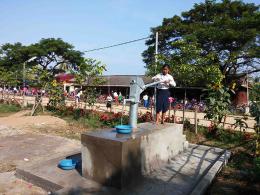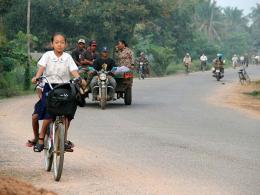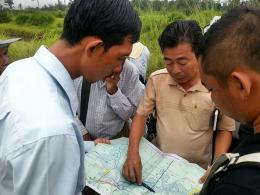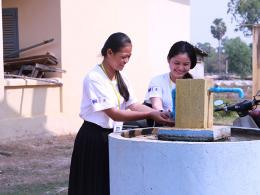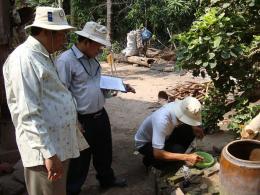Building Climate Resilience for Rural Water Supply Infrastructures in Cambodia (bcr-ws)
Background
Cambodia has abundance water resources, but its quantity and quality vary in different locations and seasons. For example, the highland and coastal areas usually face low water distribution toward the dry season. The growing demands of water for different purposes in agriculture, industry, and fisheries sectors also brought pressure on water availability. According to the climate change project in Cambodia, temperature will be higher and rainfall patterns will become erratic. Droughts will reduce recharge capacity of aquifer. Flooding events will damage existing water infrastructure and cause erosion and land degradation of the riverbanks. Increasing incidences of diseases such as malaria, dengue fever, and water borne diseases (diarrhea, cholera) caused from floods and respiratory disease are associated with droughts.
The provision of water supply and sanitation services is particularly vulnerable to the projected changes in climate conditions (temperature and precipitation among others). Water supply and sanitation infrastructure may experience a greater risk of damage because of the frequent and/or more intense extreme weather events, floods, and drought. In addition, warmer temperatures may increase evaporation from surface waters and reduce water supply availability. This project was designed to support the implementation of some actions for building and upgrading the water supply infrastructure to be climate resilient through developing institutional capacity, coordination, testing, and using tools and technical guideline produced by development partners such as CCCA, UNICEF and ADB.
Overall Objective
The proposed project aims to increase access to safe water and sanitation for all year round of Rural communities in project target areas
Specific Objectives
1. Strengthen institutional capacity on adaption and mitigation options for the rural water supply infrastructures;
2. Increase climate resilient rural water supply infrastructures in project target areas; and
3. Increase awareness of vulnerable communities in the project target areas; and climate change impacts, and the necessary adaptation and mitigation measures needed for Rural Water Supply and Sanitation.
Approach
The main approach that will be applied in this modeling project is the synthesis of efforts, technologies, tools, and best practices to develop and test climate resilient for rural water supply infrastructures. Sustainability of the project outcomes is a common challenge in rural development in Cambodia, so the project will promote the local participation and ownership in Water Supply Management through awareness raising, capacity development in managing water supply in their community. Thepractices and approach of the project will be integrated in the planning system of the rural development at national and sub‐national level. Climate change technical working group of MRD coordinated and supported the development of CCAP 2014‐2018, and developed and implemented projects and research studies in the climate change. In addition, the Department of Rural Water Supply (DRWS) has been developing the technical guideline for design and construction of the rural water supply infrastructures in which consideration of climate resilient design and construction were included. This project will contribute to finalization as well as piloting the technical guideline.UNICEF Cambodia were invited to be the technical partner of this project to provide the capacity building to finalize technical guideline and use tools to conduct vulnerability assessment, design and construct the climate‐ proofed water sources.
Outputs and Key Activities
| Result | Key Activities |
|---|---|
|
|
|
|
Knowledge Products
• Training Modules • Practical Guideline for climate risk assessment and design, and O&M for climate resilient rural water supply infrastructure • A finding report on Cost and Benefit Analysis (CBA) • A short video on the process, methodologies and achievements of the project •A short concept note for climate-resilient water supply in Cambodia for the Green Climate Fund
| Timeframe | Total Budget | Partners | Location |
|---|---|---|---|
|
October 2020 - March 2023 |
USD 270,000 (Total) CCCA USD 250.000 |
UNICEF |
Kampong Thom province |


